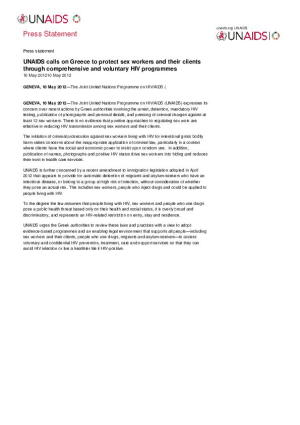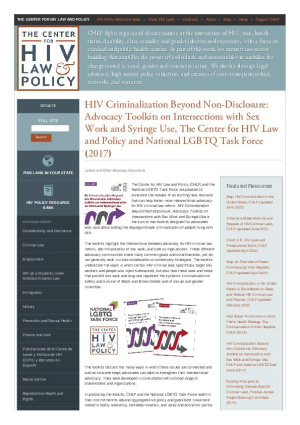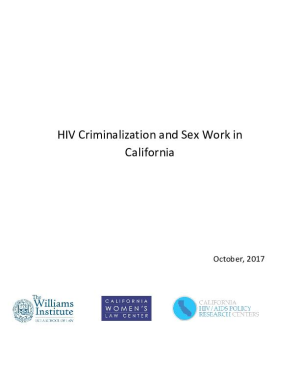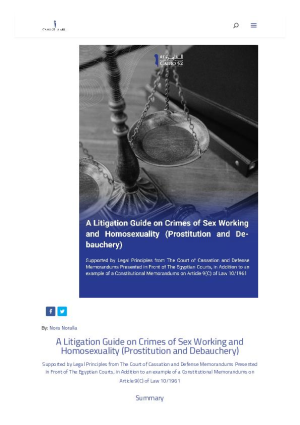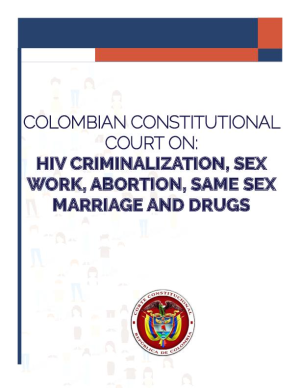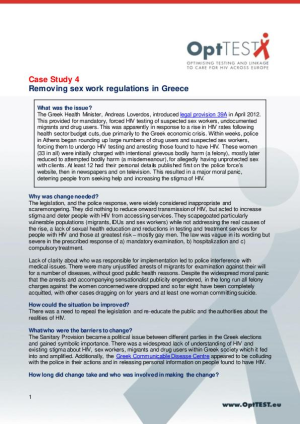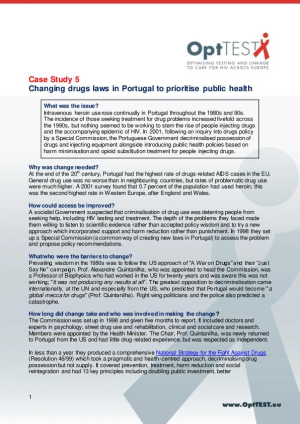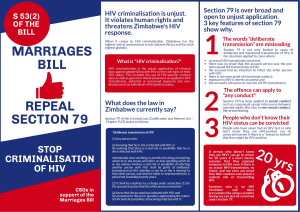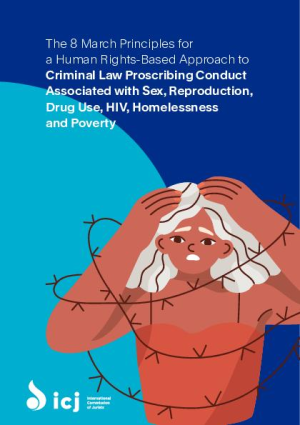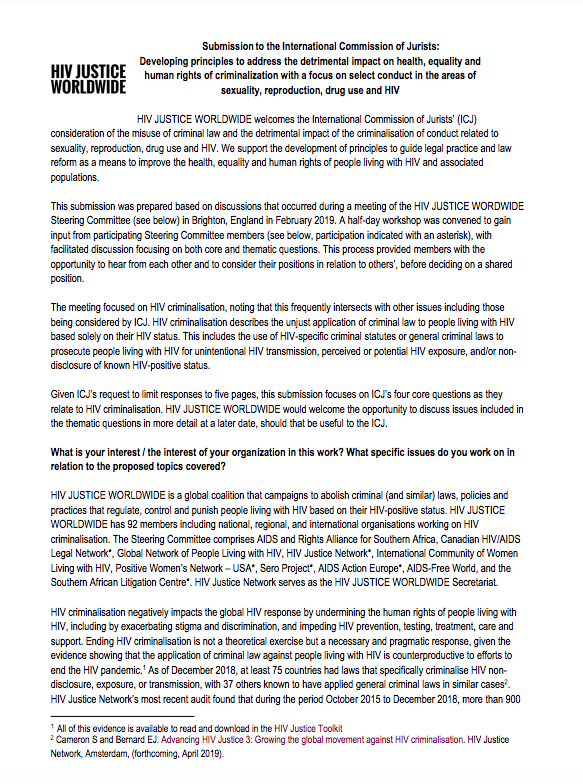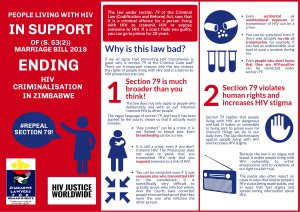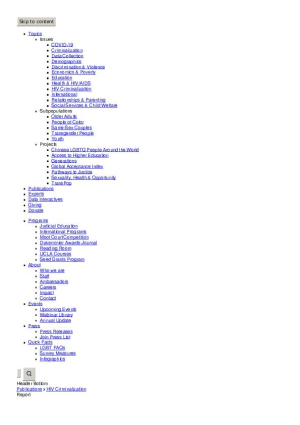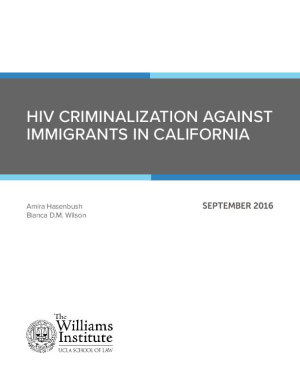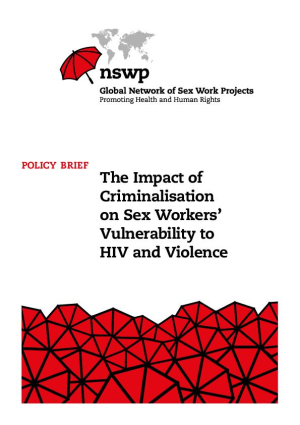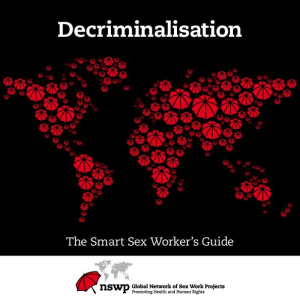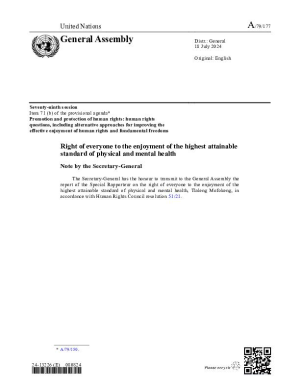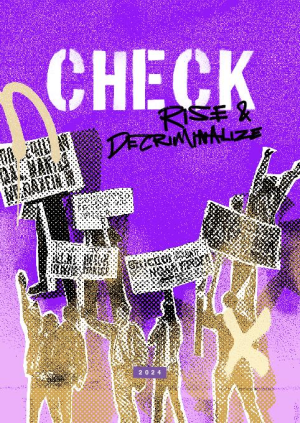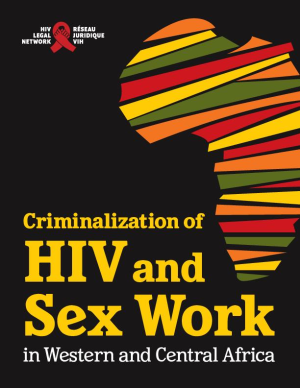Presents a public health law mapping of U.S. states that mandate HIV testing and criminalize HIV positive sex workers. Shows HIV transmission and exposure laws interact with sex work laws to compound criminal penalties for people charged with prostitution related crimes. Argues that decriminalization of sex work and HIV transmission and exposure is integral to effectively address the HIV epidemic.
Intersectionality
The intersection of HIV criminalisation with the criminalisation of other populations
UNAIDS calls on Greece to protect sex workers and their clients through comprehensive and voluntary HIV programmes
UNAIDS expresses its concerns about the Greek Government’s treatment of alleged sex workers and also asylum seekers who may have an infectious disease.
- Alternative links
- French / Français, Russian / РУССКИЙ , Spanish / Español,
The Intersection of Sex Work and HIV Criminalization: An Advocate’s Toolkit
This 2017 toolkit from The Center for HIV Law and Policy (CHLP) and the National LGBTQ Task Force highlights intersections between the criminalisation of sex work and HIV, noting both disproportionately affect people from marginalised communities. Urges the building of stronger linkages across HIV criminalisation and sex work movements, and provides tips to make advocacy more inclusive, effective, collaborative and transformative.
HIV Criminalization and Sex Work in California
This study analyses the California Department of Justice criminal history data on arrests of people who had felony solicitation while HIV-positive from 2005 to 2013 and compared the demographics and frequencies with arrest data on sex work over the same time period. Findings indicate a clear disproportionate representation of Black women among those arrested for sex work, in the context of HIV and in general.
The Intersection of Syringe Use and HIV Criminalization: An Advocate’s Toolkit
This 2017 toolkit from The Center for HIV Law and Policy (CHLP) and the National LGBTQ Task Force highlights intersections between the criminalisation of injecting drug use and HIV, noting people living with HIV who inject are criminalised in multiple ways including by laws targeting sharing equipment; purchasing, possessing or distributing equipment; drug possession and use; and HIV exposure, non-disclosure and transmission. Notes repeated calls to address substance use as a public health issue, and provides tips to make advocacy more intentional, intersectional, inclusive, and effective.
A Litigation Guide on Crimes of Sex Working and Homosexuality
This an English Summary of the book “A Litigation Guide on Crimes of Sex Working and Homosexuality (Prostitution and Debauchery) “. The book aims to provide a litigation guide and a legal overview of principles and procedures to legal advocates and whoever wishes to know more about “prostitution” or “debauchery” crimes under Egyptian law.
Colombian Constitutional Court on: HIV Criminalization, Sex Work, Abortion, Same Sex Marriage and Drugs
This document presents some of the most relevant and recent decisions in which the Court has discussed the limits to individual liberty, autonomy and privacy among issues concerning matters like: (i) HIV criminalization and other protections; (ii) sex work; (iii) abortion or voluntary interruption of pregnancy; (iv) rights of same sex couples to marriage; and, (v) personal drug possession and consumption.
Countries that criminalise same-sex relationships, sex work and drug use have poorer HIV outcomes
Countries that criminalise same-sex relationships, sex work and drug use have significantly more people with undiagnosed HIV and lower rates of viral suppression than countries that do not criminalise, or criminalise these areas to a lesser extent. Countries with human rights protections in place fared much better than those without on these HIV-related indicators, according to an analysis by Dr Matthew Kavanagh of Georgetown University.
OptTEST case study 4: Removing sex work regulations in Greece
In April 2012, the Greek police carried out a massive operation in downtown Athens, arresting drug users and sex workers, forcing them to undergo HIV testing and charging them with prostitution. This case study explores the response from human rights and HIV groups both in Greece and internationally and the following campaign to repeal the provision.
OptTest case study 5: Changing drugs laws in Portugal to prioritise public health
Presents the challenges followed by Portugal to address the increase in drug consumption throughout the 1980s and 90s. Explains the decriminalization and harm reduction strategy, along with lessons learnt.
Zimbabwe Marriages Bill – repeal section 79
In this brochure, CSOs in support of the Marriages Bill explain what the Section 79 of the Criminal Law currently say and why it is over broad and open to unjust application.
8 March Principles for a Human Rights-Based Approach to Criminal Law Proscribing Conduct Associated with Sex, Reproduction, Drug Use, HIV, Homelessness and Poverty
The Principles, published by the International Commission of Jurists are based on general principles of criminal law and international human rights law and standards. They seek to offer a clear, accessible and workable legal framework – as well as practical legal guidance – on applying the criminal law to conduct associated with: sexual and reproductive health and rights, consensual sexual activities, gender identity and expression, HIV non-disclosure, exposure or transmission, drug use and homelessness and poverty. The principles are additionally intended to address the detrimental impact of the criminalization of this conduct on health, equality and other human rights.
Analysis of the national legislation of the Georgia related to SOGI and HIV
Submission to the International Commission of Jurists: Developing principles to address the detrimental impact on health, equality and human rights of criminalization with a focus on select conduct in the areas of sexuality, reproduction, drug use and HIV
This submission was prepared based on discussions that occurred during a meeting of the HIV JUSTICE WORDWIDE Steering Committee. The meeting focused on HIV criminalisation, noting that this frequently intersects with other issues including those being considered by ICJ.
People Living with HIV in support of (S. 53(2)) MARRIAGE BILL 2019 IN ZIMBABWE
In this brochure, Zimbabwe Lawyers for Human Rights and HIV Justice Worldwide explain why the section 79 of the Criminal Code violates the rights of people living with HIV and is a barrier to HIV prevention and care.
Uzbekistan 2022 — Homophobia and Persecution Encouraged in Society
In October 2020, Uzbekistan was elected to the UN Human Rights Council for the period from 2021 to 2023. According to the resolution establishing this Council, a member country must «uphold the highest standards in the promotion and protection of human rights1». In 2022, ECOM registered 80 cases of violations of the rights of LGBT people. This report illustrates multiple unresolved problems in Uzbek society that are largely supported by the inaction of the authorities
HIV Criminalization in Pennsylvania: Enforcement of “Prostitution and Related Offenses” Crimes
Pennsylvania has several laws that criminalize or enhance criminal penalties for people living with HIV. Three of those laws enhance penalties for “prostitution and related offenses” based on a person’s HIV status. Using data from the Administrative Office of Pennsylvania Courts, this study examines the enforcement of HIV-related prostitution and related offenses in Pennsylvania since 2015.
HIV Criminalization Against Immigrants in California
The Williams Institute researchers analyzed California Criminal Offender Record Information (CORI) data on HIV offenses in California to explore the demographics and experiences of foreign born individuals as compared to their U.S. born counterparts. While only 30% of immigrants in this data set had immigration proceedings recorded in their criminal history, among them, one in four had those proceedings initiated after and HIV-specific incident. This emphasizes the impact that HIV criminalization can have on the lives of noncitizen immigrants above and beyond the impact on their citizen peers.
The Impact of Criminalisation on Sex Workers’ Vulnerability to HIV and Violence
This policy brief examines the impact of laws that criminalise sex work, informed by NSWP members’ submissions to an e-consultation. It examines the impact of criminalisation at three distinct phases: the surveillance and policing of sex workers prior to arrest; arrest and formal involvement of the criminal justice system; and release and return to the community. The paper covers various areas of law and law enforcement practices that disproportionately impact sex workers, including immigration laws, policing of public spaces, anti-LGBTQ laws, HIV criminalisation and religious codes.
Smart Sex Worker’s Guide to Decriminalisation
This Smart Guide provides an overview of existing sex work legal models and details the processes that have been used to develop legislative models that respect and protect sex workers’ human and labour rights. It aims to provide sex workers’ rights organisations with ideas and strategies that they can adapt to their own legal framework and context, to use in their advocacy and campaigning in their own countries. It also highlights the learning and best practices from both New Zealand and Australia, as well as the potential challenges and pitfalls involved in pursuing a decriminalisation advocacy strategy.
Right of everyone to the enjoyment of the highest attainable standard of physical and mental health
In her report to the General Assembly, Dr. Tlaleng Mofokeng, the Special Rapporteur on the right to health, explored the model of harm reduction as applicable to cases of drug use, HIV exposure, transmission and non-disclosure, abortion, same-sex relations, and sex work. She highlighted populations that are often stigmatised, criminalised and discriminated against to the detriment of their enjoyment of human rights and urged States to “divest from punitive approaches, move away from criminalisation and employ regulatory tools to improve health outcomes.”
Intersecting issues, identities, and barriers in access to health care, HIV services & sexual and reproductive health and rights among key populations in Central and Eastern Europe & Central Asia
This briefing paper explores the impact of intersecting identities—such as LGBT, people who use drugs (PWUD), sex workers (SW), and people living with HIV (PLHIV)—on health access, agency, and social justice in the context of structural inequalities and stigma. Using the framework of intersectionality, it examines how overlapping identities shape lived experiences of discrimination, influencing mental and physical health outcomes and access to healthcare services. The paper is based on cross-regional consultations conducted across 14 countries in Central and Eastern Europe and Central Asia (CEECA), including surveys and focus group discussions with 103 individuals with multiple intersecting identities.
Check – Rise and Decriminalise
In this issue of Check, you will find information about drug laws in the region, the spectrum of drug policy, what are alternatives to punishment for drug crimes and what is not, interviews with leaders of the Rise & Decriminalize movement, and other stories about drug policy in the region. The Rise & Decriminalize Movement unites 5 regional networks – ECOM, EHRA, ENPUD, EWNA & SWAN – and is tailored to commonly advocate for the rights of vulnerable populations, including LGBTQI+, people who use drugs, women living with HIV, and sex workers.
Criminalization of HIV and sex work in Western and Central Africa
This paper aims to explore the intersection of HIV criminalization and sex work to better understand how HIV criminalization affects sex workers, but also how the different forms of HIV criminalization and sex work reinforce each other and exacerbate violence and discrimination against sex workers living with HIV in the region.
This project is a continuation of the work initiated by And Soppeku, an organization of sex workers in Senegal, which published an advocacy document on the issue in 2023, with the support of HIV Justice Worldwide.


